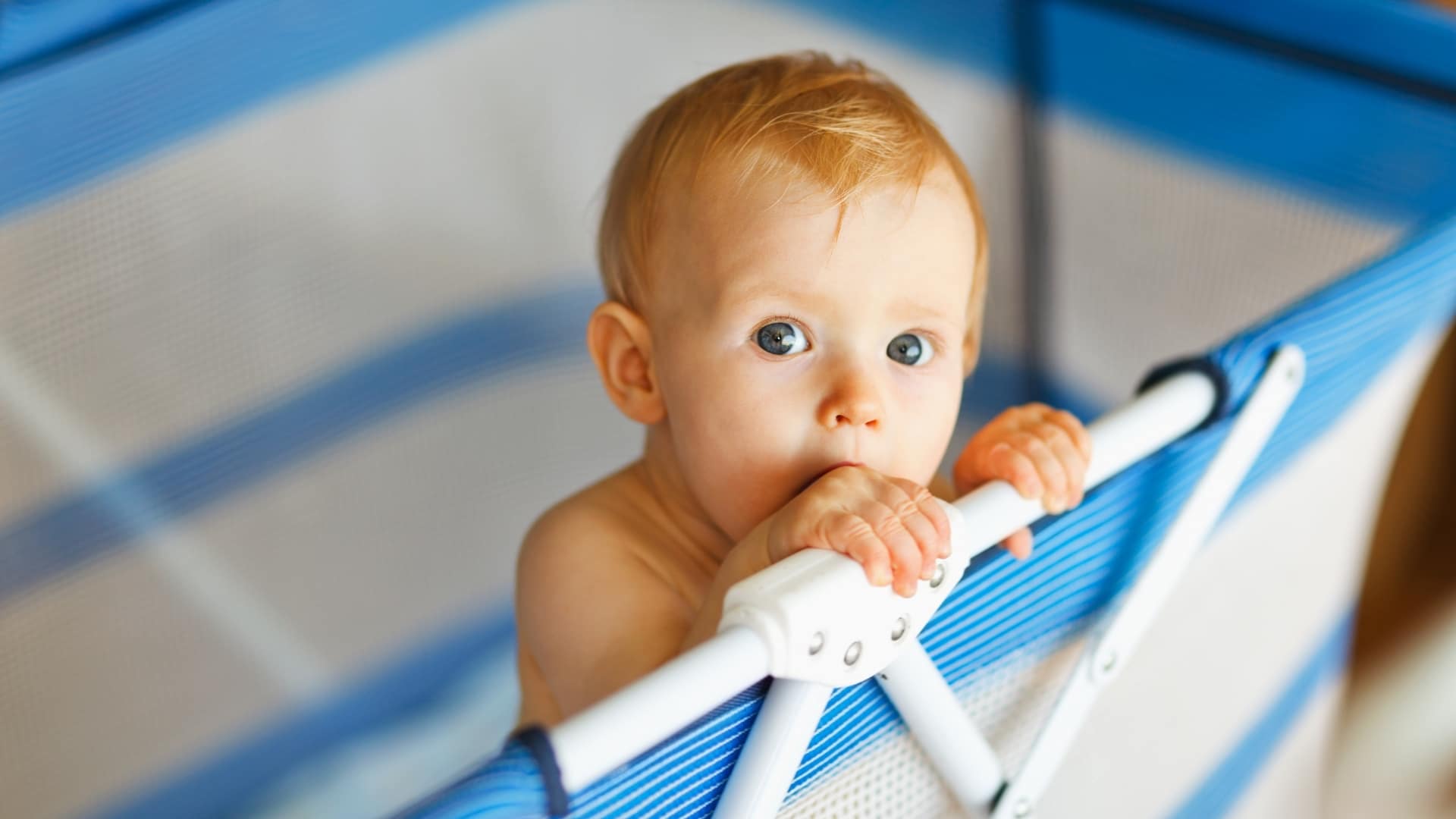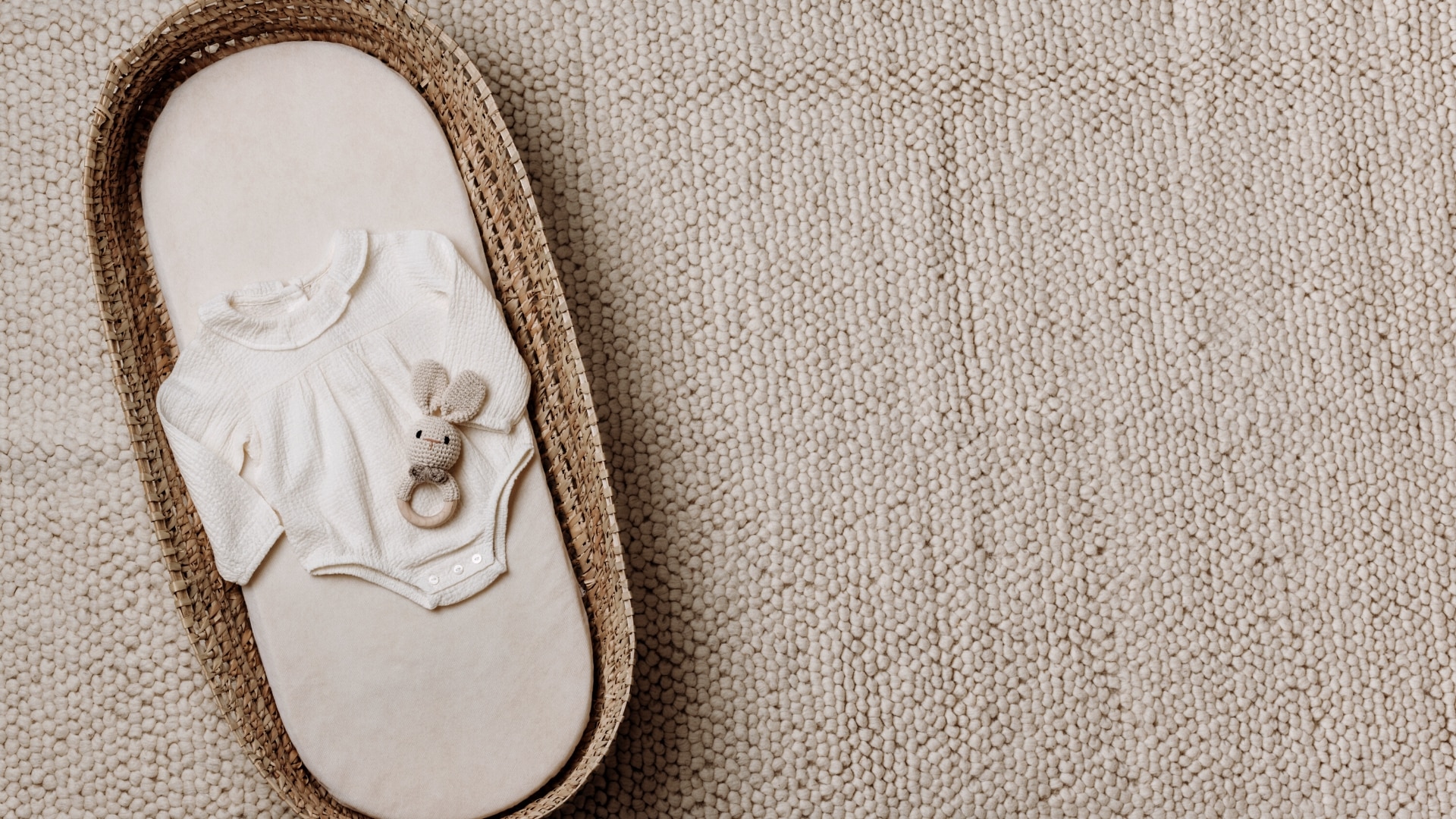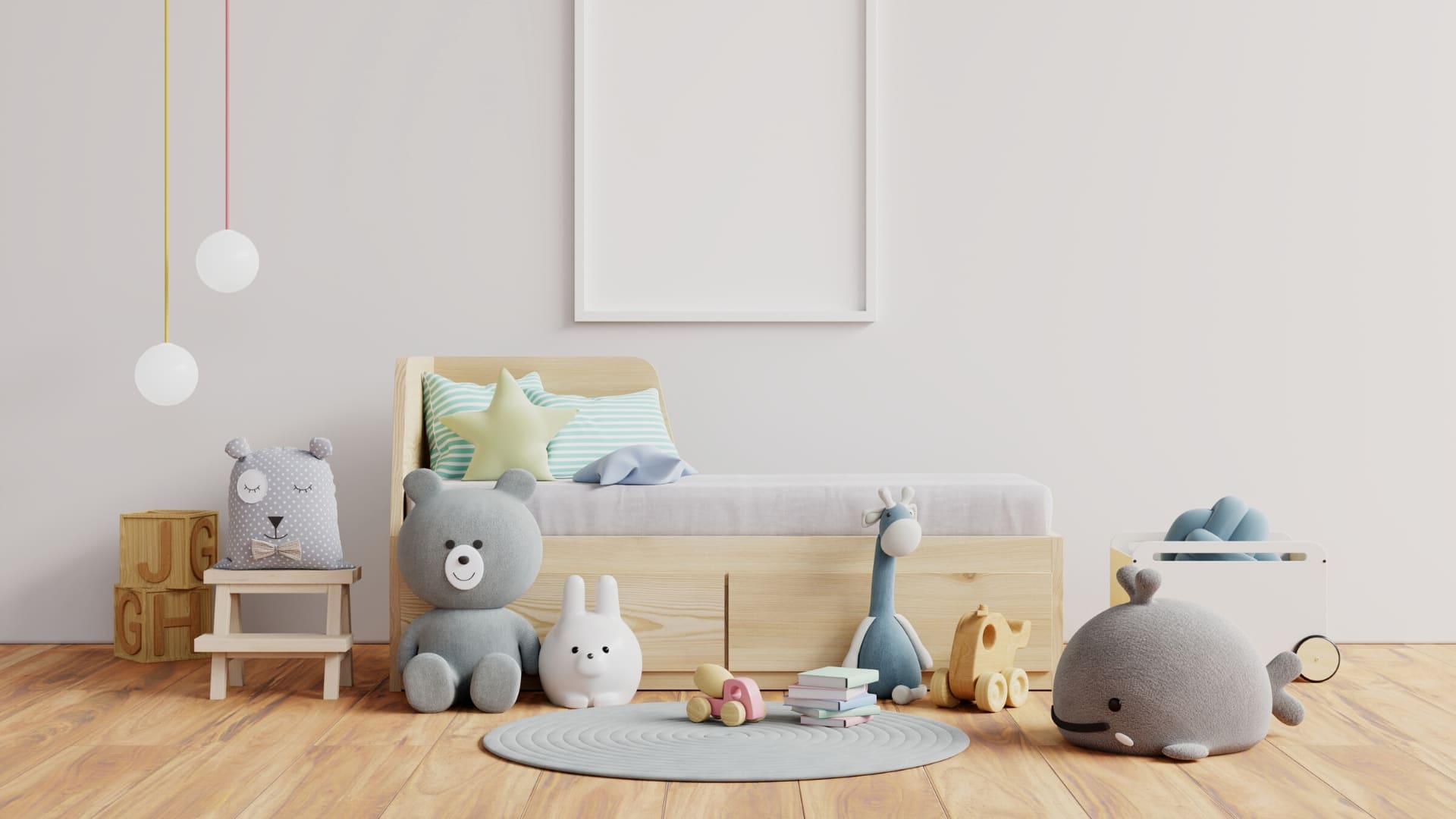Learning to recognize baby sleep cues is key to establishing a healthy age-appropriate sleep routine so your little one gets the rest they need. But what are the most common baby sleep cues? Do they vary from baby to baby? Are they easy to spot?
Here’s all you need to know about the subtle, important, and vital sleep cues your baby will show.
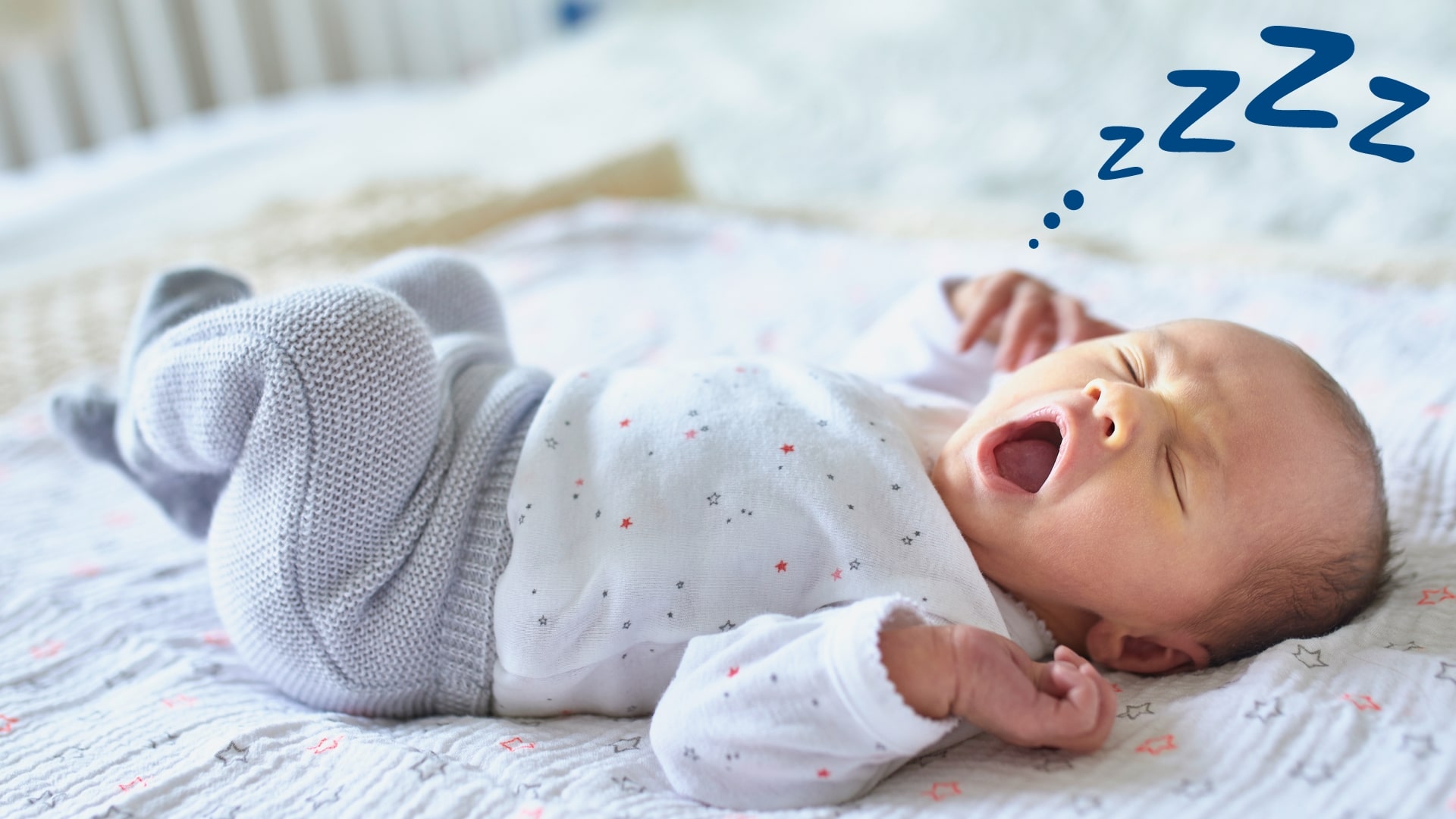
Table of Contents
Key Takeaways
- Learn to recognize early, middle, and late baby sleep cues. Early cues like staring into space indicate tiredness is setting in, while late cues like eye rubbing mean baby needs to sleep immediately. Identifying cues helps put baby down before overtiredness sets in.
- Create healthy sleep routines and schedules around baby’s sleep cues. Note when baby naturally shows sleep cues and plan nap times and bedtime around this. Being consistent, even on weekends, will regulate baby’s body clock.
- Respond promptly to sleep cues but consider context too. Reacting to sleep cues in a timely way is important. But first, think about if baby has been recently fed or changed. Cues can sometimes mean your baby just needs a cuddle, not always sleep.
What Are Baby Sleep Cues?
Baby sleep cues are external signs that your little one is tired and ready for sleep. These cues can be subtle or obvious, and they vary from baby to baby. Sleep cues will also change as your baby becomes more tired.
15 Crucial Baby Sleep Cues You Must Look Out For
To have the best chance of settling your little one to sleep, pay attention to your baby’s early sleep cues and do not wait until they are resorting to full-blown crying.
Getting the timing right will help your little one from becoming overtired which will result in them struggling to fall asleep or stay asleep for the length of time they need to.
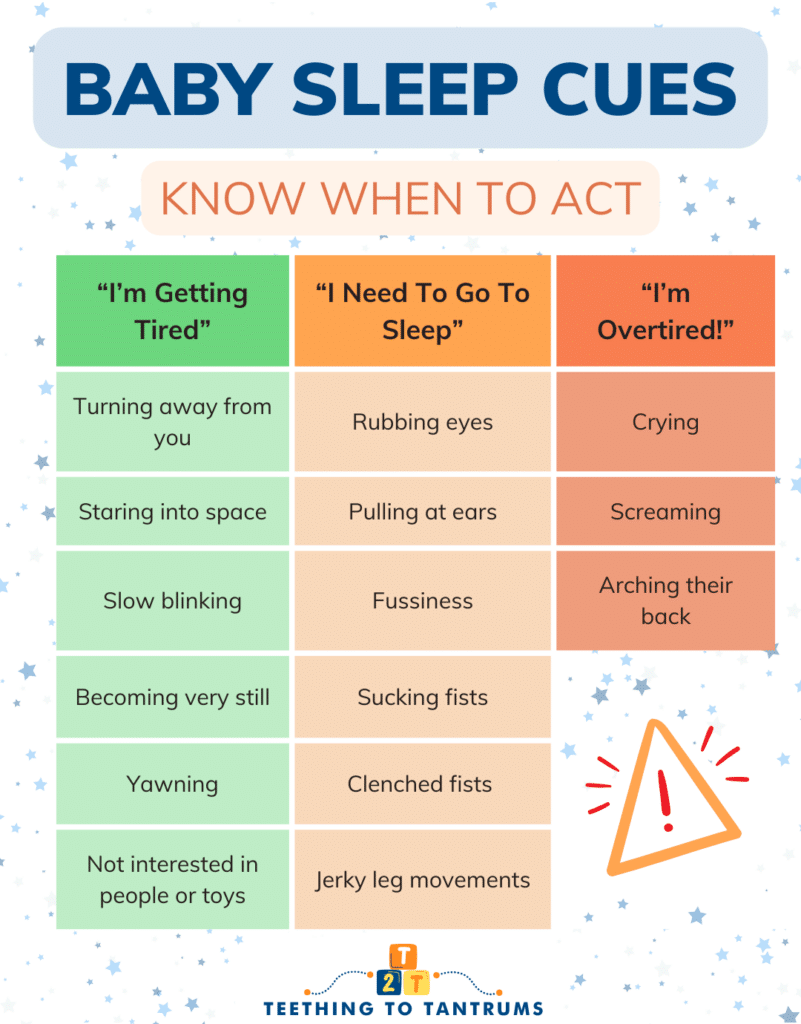
Here are the most common baby sleep cues that your baby may show you to indicate they are tired or getting tired:
- Turning away and staring into space
- Slow blinking
- Becoming very still
- No longer interested in looking at people or toys
- Yawning
Here are the later sleep cues indicating that your baby needs to go to sleep:
- Eye rubbing,
- Pulling at ears,
- Fussiness,
- Sucking fists
- Jerky leg movements
Finally, these are the sleep cues for when your baby has entered overtiredness:
- Crying
- Screaming
- Arching back
You must act swiftly when your baby shows sleep cues because once your baby is overtired, you will find it incredibly difficult to settle them. This is because an overtired baby’s body will release the hormones adrenaline and cortisol in a last-ditch attempt to give themselves energy.
Unfortunately, this has the effect of making it incredibly hard for babies to fall asleep when they need to rest the most.
Here’s a handy video from The Sleep Store to help you visualize the most common baby sleep cues:
Wake Windows And Baby’s Sleep Cues
Knowing your baby’s appropriate wake windows will also help you know if your little one is ready for sleep. Newborns have short awake times and typically stay awake for around 60 minutes before needing to sleep again.
If your baby woke from a nap around an hour ago, keep your eyes peeled for sleep cues.
To learn more about baby wake windows, head over to my post Wake Windows by Age for an in-depth dive into the wonderful world of wake windows.
Looking to get your little one to sleep quickly and effortlessly? Check out my Bedtime and Nap Cheat Sheet and master the art of making daytime naps and bedtimes as seamless as possible.
A bedtime & nap cheat sheet so good your little one will ask you to put them to bed...
Laura Williams "This is a life saver! I'm so glad I downloaded your bedtime & nap cheat sheet. My little one actually asked me to put him to bed last night! Unbelievable! Thank you so much!"
Click Here For The FREE Cheat Sheet
7 Signs Of Overtiredness In Babies
I always emphasize that avoiding overtiredness is key to establishing a healthy sleep routine.
Babies can get overtired more easily than adults, and it is important to recognize the signs that your little one is tipping towards overtiredness before you end up with a screaming baby that is fighting sleep and difficult to settle.
Here are some common sleep cues of an overtired baby:
- Fussiness
- Crying (specifically Purple Crying)
- Clinginess
- Arching the back, rigid body, and flailing limbs
- Difficulty falling asleep
- Baby will take short naps
- Baby will wake a lot more frequently at night
If you suspect your baby has got into a pattern of overtiredness they will need your help to get things back on track.
Read my post about Overtired Babies here to end the overtiredness cycle. And read my post on Why Babies Fight Sleep if you’re not sure whether overtiredness is causing baby’s sleep troubles.
Creating A Sleep Schedule Based On Baby’s Sleep Cues
After graduating from Norland College, I worked as a night nanny for several families and it was during this time I learned my most valuable lesson…
“Paying attention to your baby’s cues is one of the first parenting lessons you learn and it’s one of the most important lessons you will EVER learn.”
Recognizing your baby’s sleep cues and creating a sleep routine go hand in hand and establishing a healthy and manageable sleep schedule will ensure your little one gets the rest they need to develop.
Not to mention it will make your life so much easier too!
- Watch for sleep cues throughout the day, such as yawning, rubbing their eyes, or becoming fussy, and act upon them before your baby gets overtired. Baby sleep cues are your biggest clues to help establish a healthy sleep schedule.
- Start by establishing a regular wake-up time and bedtime. Regular bedtimes and wake-up times will help regulate your baby’s internal clock and make it easier for them to fall asleep at night. To establish a bedtime routine that works for your family, follow my Perfect Bedtime Routine Guide here.
- Keep in mind that babies have different wake windows or periods they can stay awake during the day. This is a steep learning curve for new parents, so to make your life easier, learn how to understand wake windows here. PS: Be aware that your baby’s wake windows will change as they grow.
- Establish a pre-nap routine. A pre-nap routine is similar to a bedtime routine but much shorter. The pre-nap routine should include calming activities such as reading a book or singing a lullaby, and gently winding the energy levels down in preparation for sleep.
- Create a sleep environment that is conducive to sleep, such as keeping baby’s room cool and dark with some white noise in the background. Ensure baby is dressed appropriately for the room’s temperature too.
- Avoid reinforcing unhealthy sleep associations such as rocking or feeding baby to sleep. These actions can mean your baby needs a dependency to fall asleep which can be very hard to break.
- Put baby down to sleep while drowsy but not fast asleep. Doing this from a young age will help your baby learn to fall asleep independently and will help with night wakings and establishing a healthy sleep routine as they grow. Being put down to sleep when drowsy is the beginning of learning to self-soothe and self-settle.
- Stick to the same age-appropriate routine every day, even on weekends or when traveling. Keeping routines consistent will help your baby feel secure and comfortable, making it easier for them to fall asleep and stay asleep (no matter where you are!)
Sample Baby Sleep Schedule For A 1-Month-Old
Here is a sample sleep schedule for a 1-month-old baby. You can access all of our monthly sleep schedules here.
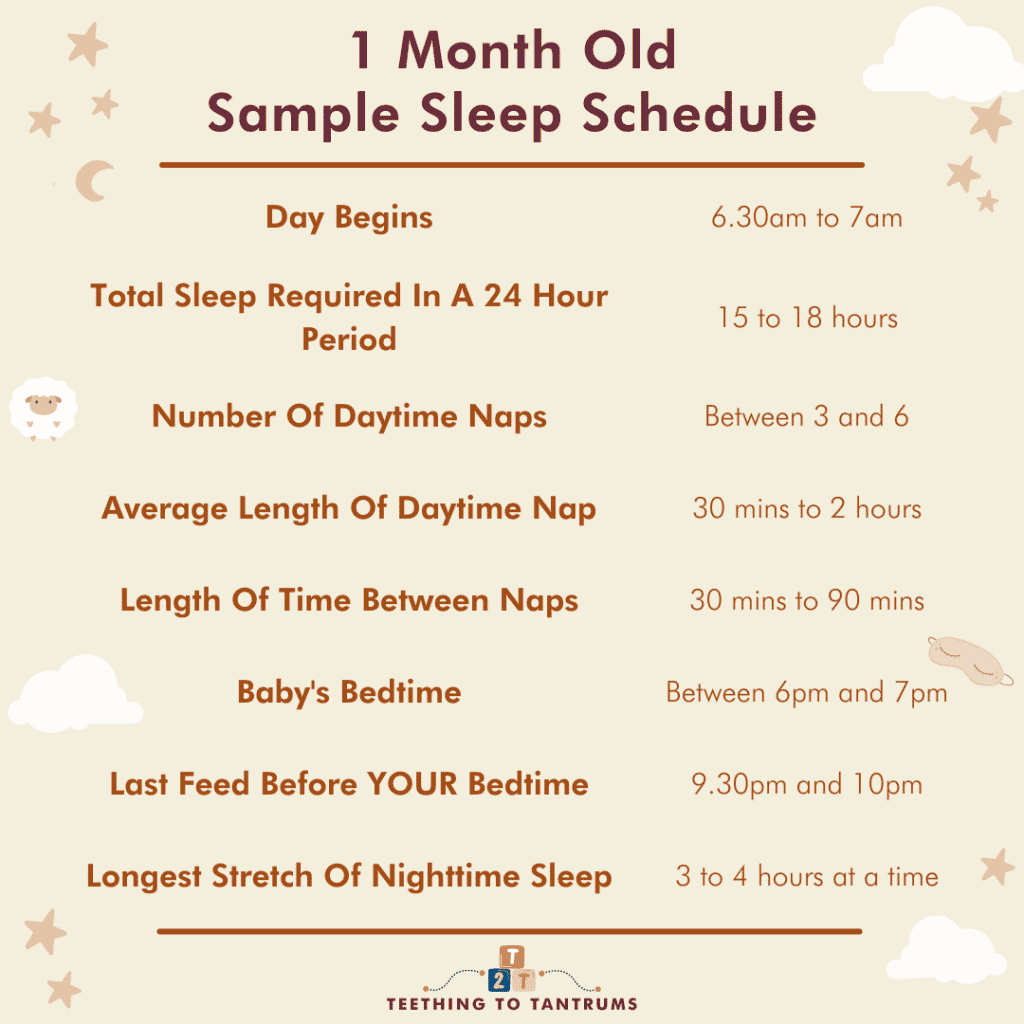
What Do I Do If My Baby Is Showing Sleep Cues Before They’ve Had A Full Wake Window?
Just like adults, some babies will have days when they are more tired than others.
Therefore, it is not uncommon for babies to show sleep cues before they have had a full age-appropriate wake window.
My rule of thumb is:
“If your baby is showing signs of tiredness, it is important to respond to their needs promptly to ensure they get the rest they need.”
Trying to keep your baby awake to “fit the schedule” will only result in your baby becoming overtired which will derail your sleep schedule in the long run.
As soon as you notice your little one giving you cues that they are tired, slow things down by reducing noise and light levels and avoid overstimulating activities.
Change baby into a clean diaper if necessary and then put them down to rest.
Remember that even a short nap can help your baby recharge and feel more alert, so if they show signs of needing to sleep let them.
TOP TIP: If your baby is showing signs of needing to sleep but you know that a feed is due… Let baby sleep. You will find that most babies will take a short nap and wake when hungry. In the early weeks and months, ensuring your baby can sleep when they need to is paramount to their healthy development.
Interpreting Baby Sleep Cues In Context
While letting your baby sleep when they need to is important… you should also take your baby’s sleep cues into context.
This is because, in the early days, your baby’s cues to tell you they need picking up, are hungry, or need a diaper change are often similar to their sleep cues.
For example, fussing, being more vocal, and squirming do not always mean your baby is tired.
Always take into account when your baby was last fed, had a diaper change or when they last slept when deciding if they really need to sleep.
Sometimes your little one may just need a cuddle or a change of scenery.
If you pick baby up and offer them an alternative stimulation and they stop showing “sleep cues” then the chances are they were not tired.
Frequently Asked Questions About Baby Sleep Cues
Looking for more information about baby sleep cues? Here are the most frequently asked questions I get asked all the time, answered just for you.
Q: What are the 4 stages of sleep in babies?
A: Babies go through four stages of sleep, including light sleep, deep sleep, active sleep, and REM sleep. During each stage, their body and brain undergo different changes that are essential for their growth and development.
Q: Do all babies have sleep cues?
A: Not all babies show the same sleep cues, but they will all have their own cues for when they are sleepy. It’s important to learn your baby’s individual cues so that you can respond to their needs and help them get the sleep they need.
Q: How can I tell if my baby is sleepy?
A: You can tell if your baby is sleepy by looking for signs of fatigue, such as rubbing their eyes, yawning, or becoming fussy. However, your baby will have their own individual sleep cues which you must respond to accordingly.
Q: Should you put baby to sleep as soon as they yawn?
A: While yawning is a sign that your baby is tired, it’s not always an indication that they need to go to sleep immediately. Most babies will have more than one cue to indicate they are ready for sleep. Feel free to refer to my baby sleep cue chart for a handy visual of sleep signs to look out for.
Need More Parenting Help?
- Download our FREE Perfect Sleep Cheat Sheet. It’s a free, easy-to-use and proven formula designed for parents of 0-5 year olds to master the art of consistently undisturbed and restful sleep without the yelling, nagging or exhausting long-winded evenings.
- Check out our Parenting Toolbox. You’ll get access to expertly-chosen products that you can guarantee are the best for your little one and your wallet.
- Ready to create the calm, peaceful evenings you deserve? Then checkout our most popular course - The Bedtime Battles Masterclass

A bedtime & nap cheat sheet so good your little one will ask you to put them to bed...
Laura Williams "This is a life saver! I'm so glad I downloaded your bedtime & nap cheat sheet. My little one actually asked me to put him to bed last night! Unbelievable! Thank you so much!"
Click Here For The FREE Cheat Sheet
